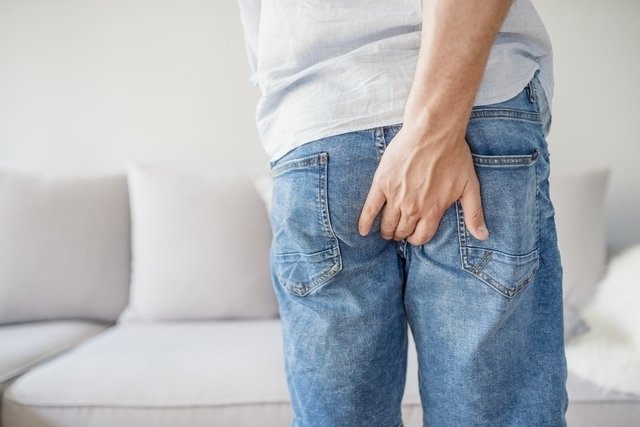Rectal bleeding is usually related to the presence of hemorrhoids and anal fissures. It an also occur with intestinal infection, proctitis or even rectal cancer.
Anal bleeding may be noted during constipation, as stool tends to be harder and drier. Passing hardened stool can injure the anus and cause micro-tears, leading to bright red blood in the stool.
It is important to see a doctor you notice rectal bleeding frequently, or if you have other symptoms like mucus in the stool, weight loss with no obvious cause, and abdominal bloating. With a thorough assessment, the doctor will be able to identify the cause of anal bleeding and initiate the most appropriate treatment.

What causes rectal bleeding?
The most common causes of anal bleeding are:
1. Hemorrhoids
Hemorrhoids are dilated veins that can emerge within the rectum or around the anus. They typically bleed with bowel movements, especially with excessive straining or very hard, dry stool. In addition to rectal bleeding, it is common for people to also experience itching, blood in the stools, pain and discomfort when walking or sitting, and in some cases, the presence of mucus in the stool. Learn more about what causes hemorrhoids.
What to do: It is important to change some hygiene and diet habits to prevent more hemorrhoids and ensure soft stools, which can help to alleviate some symptoms. You are advised to avoid using toilet paper, which can cause more irritation, and to ensure you are getting enough water and fiber every day. To relieve pain and discomfort, you can use a hemorrhoid ointment or suppository that contains anesthetic, vaso-constricting or corticoid properties. These can be applied directly to the hemorrhoid. Many people may also find relief with sitz baths for hemorrhoids.
If your hemorrhoids do not improve with these measures, or if you experience symptoms frequently, you should see a gastroenterologist for assessment. The doctor will inspect the hemorrhoids and determine whether surgical intervention is necessary. Check out other ways to get rid of hemorrhoids using ointments and other home remedies.
2. Anal fissure
Just like hemorrhoids, anal fissures can occur as a result of dry and hard stool, which is common with constipation. It can also be a result of anal sex without adequate lubricant, which can lead to injury in the area and cause rectal bleeding, pain, discomfort and burning with bowel movements.
What to do: You are advised to avoid using toilet paper and use wet wipes instead. You should ensure you have plenty of water and fiber intake. Pain and discomfort can be treated with anesthetic ointments.
3. Proctitis
Proctitis can also cause rectal bleeding, and it consists of inflammation of the rectal lining. This inflammation can occur due to infections, changes to blood flow or intestinal inflammation, all which can lead to the presence of mucus or blood in the stool. Read more about what can cause mucus in the stool.
What to do: In this case, you are advised to see a gastroenterologist to identify the underlying cause and to assess the severity of your symptoms. From here, the doctor can prescribe the best treatment options, which usually involve the use of anti-inflammatories. Some cases of proctitis can additionally be treated with antibiotics.
4. Intestinal polyps
Intestinal polyps are masses that occur in the intestines due to excessive cellular growth in the large intestine. When these cells are more developed and start to accumulate into small structures, they can cause some symptoms like rectal bleeding, blood in the stool, abdominal gas, constipation or diarrhea.
What to do: You should consult a gastroenterologist as soon as you notice any signs or symptoms, so that a diagnosis can be confirmed promptly and treatment can be started right away. This will help decrease the probability of the polyp turning into cancer. In most cases, intestinal polyps are surgically removed during a colonoscopy.
5. Intestinal disease
Intestinal abnormalities, like irritable bowel syndrome, Chrohn’s disease, and even intestinal infections (from Salmonella sp. for example), can also lead to rectal bleeding. Other common symptoms include abdominal pain and discomfort, fever, excess gas, diarrhea and loss of appetite. Read more about what can cause intestinal infections and other symptoms associated with them.
What to do: You should consult a gastroenterologist to assess your symptoms and confirm a diagnosis. The doctor can then start treatment as necessary, which may involve medications like anti-inflammatories or antibiotics, as well as diet changes. See the home remedies for intestinal infections that you can use to complement you medical treatment.
6. Rectal cancer
Rectal cancer is not as common, however it is most seen in older adults. Many patients report anal bleeding, the presence of blood or mucus in the stool, anal swelling, or a rectal nodule or lump. Learn about other conditions that can cause a lump in the anus.
What to do: If you note any signs or symptoms of rectal cancer, you should see a gastroenterologist for assessment. Prompt treatment is necessary to prevent further complications. Anal cancer can be treated with surgery to remove any small tumors in the area, as well as with chemotherapy and radiation therapy.
